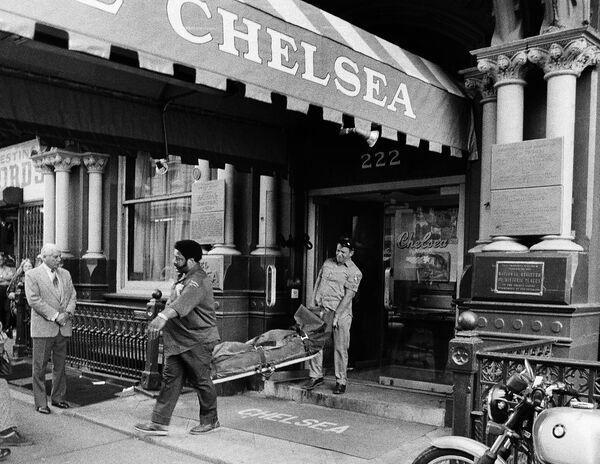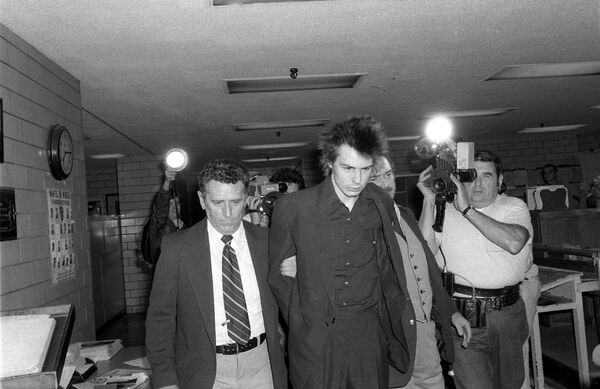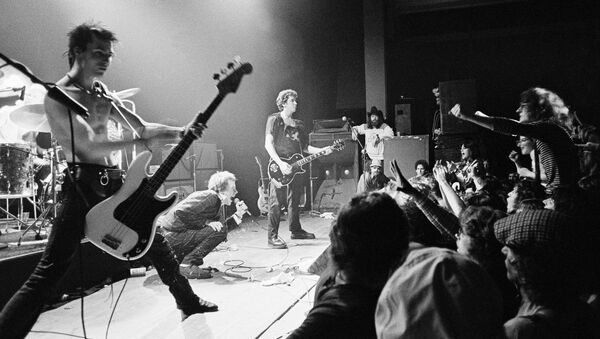On October 12, 1978 Sid Vicious, the bass guitarist with the punk rock band The Sex Pistols was arrested in New York after his girlfriend Nancy Spungen, 20, was stabbed to death in their room at the Chelsea Hotel, a frequent hang-out for rock stars.
Vicious — whose real name was John Ritchie and whose mother was a registered drug addict — was later released on bail and died of a heroin overdose in February 1979 before he could go on trial.
The Sex Pistols broke up — with Johnny Rotten going on to form another band, Public Image Limited, and many see Sid's death as the end of punk rock, although bands like The Clash, The Stranglers and the Ramones would soldier on well into the 1980s
Stacey Savage, who runs an Instagram page called History of Punk, was 16 in 1978 and fell in love with the music and the culture.
She said she remembered Nancy Spungen's death and the demise of Sid five months later but could not comprehend it.
"I did not understand it. Murder always has something intentional for me, even then I thought so. The circumstances of Nancy's death were everything, just not an intent. For us, it felt like the process of making a hated punk symbol to prove how dangerous this scene really is," Ms. Savage told Sputnik.

Vicious, who was 21, and Spungen shared a love of drugs and both were heroin users at the time of her death.
He told police he woke from a drug-induced stupor on the morning of October 12 and found his girlfriend dead on the bathroom floor, stabbed once in the abdomen. She had bled to death.
Vicious admitted he had bought the knife which killed her from Stiy Bators, from the American punk band the Dead Boys but he struggled to remember the events surrounding her death.
A 16 year old Sid Vicious going to a David Bowie concert at Earls Court, 1973. pic.twitter.com/2cx63AepOx
— History Lovers Club (@historylvrsclub) 4 October 2018
"I stabbed her, but I never meant to kill her," Vicious told police, but later said she fell onto the knife during a row.
Would he have been convicted of murder if the case had gone to trial?
"With the US legal system and the media's influence on the jury, a guilty verdict would have been very likely," Ms. Savage told Sputnik.
But did he actually intend to kill her?
Sid Vicious and Nancy. pic.twitter.com/rd1hHNGyy0
— ToxicMind. (@22killerqueen) 10 October 2018
"I have no idea. I mean he did not have control over what he did. He needed help, which he should have accepted, not rejection, prejudice and contempt," Ms. Savage told Sputnik.
Spungen was a university dropout who had been diagnosed with schizophrenia at 15. She worked as a stripper in New York before moving to London and befriending various punk rockers, before finally shacking up with Vicious.
They shared a dark love for heroin, which would lead to their deaths.
"They lived too fast for this short life," Ms. Savage told Sputnik.
street art, sid vicious pic.twitter.com/KdKgaGOGbC
— Street Art Magic (@streetartmagic) 9 October 2018
The Sex Pistols only made one album — Never Mind The B******s — but their impact on the musical world was huge and several of their songs, including God Save The Queen, Pretty Vacant and Anarchy In The UK, remain iconic.

While Johnny Rotten was the intelligent, snarling and bad-tempered front man, Vicious was almost as important for their public image — the handsome but dangerous (and drug-addicted) thug with the spiky hair do who embodied the terrifying image of punk to their detractors.
"He wasn't the brightest spark on the planet, Sid, but he was my friend and I miss him very much, I got to tell you. And I felt really guilty about bringing him into the Pistols because he was ill-equipped mentally to deal with the pressures…the trouble with heroin is that it hides the inadequacies of self-doubt," Rotten told the BBC.
Punk rock faded out in the early 1980s but numerous bands — including Nirvana, Green Day, The Hives, Metallica and NOFX — would later say it was heavily influential in their sound.
"Punk has achieved everything and nothing. A movement has emerged and almost completely disappeared. A lot of people still live or live according to this attitude. What will remain permanent is the memory of this glorious time and the best music ever," Ms. Savage told Sputnik.



